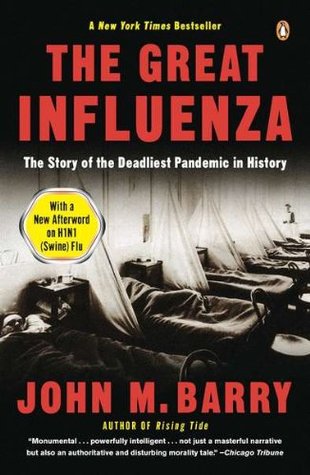Diane's Reviews > The Great Influenza: The Story of the Deadliest Pandemic in History
The Great Influenza: The Story of the Deadliest Pandemic in History
by

by

This was a fascinating read about the 1918 flu pandemic, and a good overview of the history of medicine in America. I don't remember learning much about this topic in school — teachers seemed to treat it like more of a footnote to World War I, which was itself treated as a footnote to all the coverage of World War II.
But a friend had recommended this book to me more than a decade ago (he was always recommending big works of nonfiction), and it took the coronavirus outbreak for me to finally get it from the library and dedicate myself to reading it. Here is a good introductory section from the Prologue:
Barry has a gift for writing narrative nonfiction; I was engrossed in this book, even though parts of it were a bit technical and required extra focus to follow along. I listened to this on audio, narrated by Scott Brick, who gave an excellent performance. I appreciated this book so much I looked up Barry's other works and intend to read them as well.
While a lot has changed in 100 years, a lot has also stayed the same, including how selfish and stubborn people can be, how elected officials often fail to lead during a crisis, and that some people get angry when scientists and experts tell them things they don't want to hear. Here is a good quote from the Afterword that has stayed with me:
But a friend had recommended this book to me more than a decade ago (he was always recommending big works of nonfiction), and it took the coronavirus outbreak for me to finally get it from the library and dedicate myself to reading it. Here is a good introductory section from the Prologue:
In 1918 an influenza virus emerged — probably in the United States — that would spread around the world, and one of its earliest appearances in lethal form came in Philadelphia. Before that worldwide pandemic faded away in 1920, it would kill more people than any other outbreak of disease in human history. Plague in the 1300s killed a far larger proportion of the population — more than one-quarter of Europe — but in raw numbers influenza killed more than plague then, more than AIDS today ...
And they died with extraordinary ferocity and speed. Although the influenza pandemic stretched over two years, perhaps two-thirds of the deaths occurred in a period of twenty-four weeks, and more than half of those deaths occurred in even less time, from mid-September to early December 2018. Influenza killed more people in a year than the Black Death of the Middle Ages killed in a century; it killed more people in twenty-four weeks than AIDS has killed in twenty-four years.
Barry has a gift for writing narrative nonfiction; I was engrossed in this book, even though parts of it were a bit technical and required extra focus to follow along. I listened to this on audio, narrated by Scott Brick, who gave an excellent performance. I appreciated this book so much I looked up Barry's other works and intend to read them as well.
While a lot has changed in 100 years, a lot has also stayed the same, including how selfish and stubborn people can be, how elected officials often fail to lead during a crisis, and that some people get angry when scientists and experts tell them things they don't want to hear. Here is a good quote from the Afterword that has stayed with me:
In 1918 the lies of officials and of the press never allowed the terror to condense into the concrete. The public could trust nothing and so they knew nothing. So a terror seeped into the society that prevented one woman from caring for her sister, that prevented volunteers from bringing food to families too ill to feed themselves and who starved to death because of it, that prevented trained nurses from responding to the most urgent calls for their services. The fear, not the disease, threatened to break the society apart. As Victor Vaughan — a careful man, a measured man, a man who did not overstate to make a point — warned, "Civilization could have disappeared within a few more weeks."
So the final lesson, a simple one yet one most difficult to execute, is that those who occupy positions of authority must lessen the panic that can alienate all within a society. Society cannot function if it is every man for himself. By definition, civilization cannot survive that.
Those in authority must retain the public's trust. The way to do that is to distort nothing, to put the best face on nothing, to try to manipulate no one. Lincoln said that first, and best.
Leadership must make whatever horror exists concrete. Only then will people be able to break it apart.
Sign into Goodreads to see if any of your friends have read
The Great Influenza.
Sign In »
Reading Progress
July 5, 2012
– Shelved
May 12, 2020
–
Started Reading
May 17, 2020
–
Finished Reading
Comments Showing 1-4 of 4 (4 new)
date newest »
newest »
 newest »
newest »
message 1:
by
Negin
(new)
May 31, 2020 02:57PM
 Fabulous review, Diane. Adding this to my list.
Fabulous review, Diane. Adding this to my list.
reply
|
flag
 Great quotes! I'm sure if we had a competent president that he would have read this book by now and absorbed its lessons.
Great quotes! I'm sure if we had a competent president that he would have read this book by now and absorbed its lessons.



